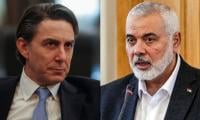ISLAMABAD: The Supreme Court (SC) Friday accepted the bail applications of former prime minister Imran Khan and former foreign minister Shah Mehmood Qureshi in the cipher case with the ruling that the discretion exercised by the high court in declining bail to the petitioners was exercised perversely.
A three-member SC bench, headed by acting Chief Justice Sardar Tariq Masood and comprising Justice Syed Mansoor Ali Shah and Justice Athar Minallah, accepted the bail applications of Imran and Qureshi subject to their furnishing of bail bonds for Rs one million with two sureties each in the like amount to the satisfaction of the trial court.
The SC held that level playing field was essential for healthy competition, ensuring that elections are a true reflection of the people’s choice, rather than the result of manipulation or coercion.
After examining the material available on record, the court found that there was no sufficient incriminating material available, at this stage to show that the petitioner, Imran Ahmed Khan Niazi communicated the information contained in the cipher telegram received from PAREP (Ambassador), Washington, USA, to the public at large with the intention or calculation, directly or indirectly, in the interest or for the benefit of a foreign power, nor the disclosed information related to any of the defence installations or affairs, nor did he disclose any secret official code to the public at large. The court, after converting the petitions into an appeal, allowed it and set aside the impugned orders of the Islamabad High Court (IHC).
Imran and Qureshi had filed appeals in the apex court against the IHC orders, issued on Oct 27, 2023 and Nov 8, 2023, whereby the post-arrest bail had been declined to them in case, FIR No 6/2023, registered at Police Station CTW/FIA, Islamabad, for the offences punishable under Sections 5 and 9 of the Official Secrets Act 1923, read with Section 34 of the Pakistan Penal Code (PPC) 1860. Both Imran and Qureshi are incarcerated at Adiala Jail in the cipher case.
The order, authored by Justice Syed Mansoor Ali Shah, says, “We, therefore, are of the tentative opinion that there are no reasonable grounds for believing, at this stage, that the petitioners have committed the offence punishable under clause (b) of Section 5(3) of the Act, but rather that there are sufficient grounds for further inquiry into their guilt of the said offence, which is to be finally decided by the learned trial court after recording of the evidence of the parties.”
The court held that the discretion exercised by the high court, in declining bail to the petitioners, is found to have been exercised perversely, that is, against the weight of the material available on the record of the case, which warrants interference by this court. “Needless to mention that the observations made in this order are tentative, which shall not, in any manner, influence the trial court, and that this concession of bail may be cancelled, if the petitioners misuse it in any manner, including causing delay in the expeditious conclusion of the trial,” the court noted down in its order.
Justice Athar Minallah agreed to the order, however, appended a separate note as well. As per the crime report (FIR), the allegation against the petitioner Imran Khan is that he communicated the information contained in a secret classified criminal document (a cipher telegram received from Parep Washington, USA) to unauthorised persons, i.e., the public at large, by twisting the facts to achieve his ulterior motives and personal gains in a manner prejudicial to the interests of the state security, and had also illegally retained a copy of the said document.
While petitioner Shah Mehmood Qureshi is alleged to have abetted him in doing so. “By these actions, it is alleged, the petitioners have directly/indirectly benefited the interest of foreign powers and caused loss to the state of Pakistan,” the court noted in its order.
The court held that in respect of such offences, other than the provisos to Section 497(1), bail is granted under Section 497 (2), CrPC, if it appears to court at any stage of the investigation, inquiry or trial that there are not reasonable grounds for believing that the accused has committed such an offence but rather that there are sufficient grounds for further inquiry into his guilt.
“The only question, therefore, before us in the present case is that whether there are not reasonable grounds for believing, at this stage, that the petitioners have committed the offence punishable under clause (b) of Section 5(3) of the Act but rather that there are sufficient grounds for further inquiry into their guilt of the said offence,” says the order.
In this regard, the court noted that they are cognizant of one of the elementary principles of the law of bail that to answer the said question, the court cannot indulge in the exercise of a deeper appraisal of the material available on the record of the case but is to determine it only tentatively by looking at such material.
“Having so examined the material available on record, we find that there is no sufficient incriminating material available, at this stage, which could show that the petitioner, Imran Ahmed Khan Niazi, communicated the information contained in the cipher telegram, received from Parep Washington, USA, to the public at large with the intention or calculation, directly or indirectly, in the interest or for the benefit of a foreign power, nor the disclosed information relates to any of the defence installations or affairs, nor did he disclose any secret official code to the public at large,” the court held.
“For the above reasons, these petitions are converted into appeals and the same are allowed and the impugned orders are set-aside,” says the order, adding that the bail applications of the petitioners are accepted subject to their furnishing of bail bonds in the sum of one million with two sureties each in the like amount to the satisfaction of the trial court.
In his separate note, Justice Athar Minallah noted that both the petitioners intend to contest the forthcoming elections which are scheduled to be held on February 8, 2024. Minallah noted that the concept of genuine election is the key to a level playing field for all stakeholders. “Incarceration of a political competitor during the period of elections, except when it is necessary due to exceptional circumstances, gravely affects the fundamental rights of the voters and prejudices the genuineness and integrity of the elections,” the judge held.
Justice Minallah further held that when all the political competitors do not enjoy the same advantages and disadvantages during the election period, then the fundamental rights of citizens are breached and, simultaneously, the Constitution is gravely violated. “It is, therefore, inevitable to ensure that every political competitor is treated equally without discrimination and everyone has the same chance to succeed,” the judge maintained.
Justice Minallah held that the incarceration of the petitioners would not serve any useful purpose. Moreover, their release on bail during the period of elections would ensure ‘genuine elections’ and thus enable the people to exercise the right to express their will effectively and meaningfully. “There are no exceptional circumstances to decline the concession of bail,” the judge noted.
Justice Minallah noted that Shah Mehmood Qureshi was one of the most senior office-bearers of the party and the questions of public importance that have arisen for consideration of this court are; whether, during the election period, candidates who intend to contest the elections or who are affiliated with a political party and their participation in the political process is important for the registered voters, should remain incarcerated, or, whether, in such an eventuality granting bail ought to be considered favourably as a rule and declined only in exceptional circumstances e.g. when there is the likelihood of absconding or there is a threat to society because there are grounds to believe that the accused may repeat the offence.
“Each party and candidate must enjoy an equal and non-discriminatory opportunity to effectively function without any fear or threat of intimidation,” Justice Minallah noted, adding that the United Nations has explicitly recognised the concept of an ‘informed choice’ as an integral part of ‘free choice’.
“There cannot be a greater public interest than ensuring genuine elections and if the incarcerated person intends to contest elections or the standing of a political party is dependent upon the latter, then, in my opinion, this ought to be considered a ground for grant of bail during the election period,” the judge held. “The concession of bail in such an eventuality should be considered favourably as a rule and declined in exceptional circumstances,” Justice Minallah held.
The judge recalled that the last general election, held in 2018, was an example of denying equal treatment to a particular political party, adding that one of the prime ministers was even sent to the gallows and people were later restrained from attending his funeral. “Half of the nation’s life has been spent under military dictators, who did not face a day’s incarceration for abrogating the Constitution, toppling elected prime ministers and subjecting political workers to the worst form of oppression,” Justice Minallah noted.
In stark contrast, Justice Minallah noted that the elected prime ministers and chosen representatives were prevented from participating in the electoral process by keeping them incarcerated or forcing them into exile.
The judge noted that the incarceration of political leadership belonging to Balochistan, the then North West Frontier Province or Sindh for their political dissent and opinions could not be erased from history books. The notion of ‘genuine election’ had remained illusory in the past seven decades, and it definitely had profound consequences for the democratic process and the rights of people.
“The unflattering electoral history and oppressive treatment of political dissidents during the period of elections necessitates considering the grant of bail favourably as a rule,” the judge held, adding that the petitioners were alleged to be involved in an offence, which did not fall under the category of offences that threaten society such as rape, child abuse, homicide, etc. Justice Minallah noted that the investigation had been completed and the trial was in progress, adding that the trial was entirely dependent on documentary evidence.
Earlier, during the course of hearing, Salman Safdar argued before the court on behalf of former prime minister Imran Khan and Ali Bukhari represented Shah Mehmood Qureshi. Salman Safdar argued that as per the allegations of the prosecution, the Federal Investigation Agency (FIA) had started an inquiry following the federal government’s instructions after the audio leak, alleging that during the meeting on March 28, 2022, in Bani Gala, a conspiracy was made to misuse the cipher.
The counsel submitted that the former premier was also accused by the FIA of keeping the cipher’s copy and not returning it. He contended that there were four persons mentioned in the FIR, registered in the case; however, the FIA is only investigating two people, adding that Asad Umar and Azam Khan were also to be investigated.
Justice Athar Minallah asked the counsel as to how FIA had the information about the Bani Gala meeting. The counsel replied that the FIA could better answer this question, as the prosecutor had not revealed the sources. Salman Safdar contended that it was claimed that the cipher was received from the Foreign Office; however, no complaint had been made from there, adding that his client former prime minister was being targeted for political purposes. The counsel further submitted that the provisions of the death sentence or life imprisonment could not be imposed against the former premier.
Acting Chief Justice Sardar Tariq Masood, however, observed that although the cipher was not shared with anyone, it had been aired. Salman Safdar contended that the meeting in which the cipher conspiracy was allegedly planned took place on March 28, 2022, while the challan alleges that Imran Khan brandished the cipher on March 27, 2022.
At this, Justice Athar Minallah observed that the original cipher is with the Foreign Office, and if it was leaked, then it is the Foreign Office’s crime. The judge observed that the cipher could not be discussed in public.
The court directed the petitioner chairman PTI Barrister Gohar Ali Khan to approach the ECP at 3pm for redressal of their grievances relating to elections. The court directed the ECP to attend to these grievances on an urgent basis and resolve them expeditiously to ensure that the electoral process remains smooth, open, transparent, free and fair.
The court directed the ECP to complete the exercise promptly without disturbing the timelines, given in the election schedule, because voters must have faith in the electoral process for the success of democracy. “It is important to remember that organizing free and fair elections is more important than the results itself,” the court noted down in its order, authored by Justice Mansoor Ali Shah. Barrister Gohar had filed a petition in the apex court under Article 184(3) of the Constitution, seeking a level playing field for the purpose of free and fair elections, alleging that district management and provincial and federal governments were not treating it at par with the other political parties.
The counsel for the petitioner submitted that they had approached the ECP under the Elections Act, 2017 by filing complaints; however, there has been no response on behalf of the ECP. Both the Attorney General for Pakistan (AGP) and the representative of ECP assured the court that elections would be held freely and fairly, as mandated under the Constitution, says the order. They assured the court that the grievance of members of the PTI or any other political party received by the ECP would be decided and resolved on urgent basis. Later, the court disposed of the petition of the PTI chairman. Earlier, ECP DG law told the court that the electoral body had not received any application about snatching of nomination papers from any aggrieved party. Justice Athar Minallah, however, observed that everything is appearing in newspapers and asked the ECP DG law as to what the electoral body had done so far in that regard. “Whatever meted out to the mother of former MNA Usman Dar, what the ECP as well as the caretaker government had done so far,” Justice Minallah asked the ECP representative. Shoaib Shaheen, counsel for the PTI, informed the court that although the schedule for the upcoming elections had been issued, orders under 3 MPOs were still being issued. He alleged that neither nomination papers were being issued to the PTI candidates nor they were being enabled to file the nomination papers. Acting Chief Justice Sardar Tariq Masood asked why the ECP was not stopping the issuance of MPO orders. The counsel requested the court that if the returning officers were not receiving the nomination papers, then ECP should be allowed to receive it. Justice Mansoor Ali Shah directed the ECP to immediately meet the political parties. Justice Athar Minallah observed that the allegations about non-provision of level playing field, levelled by the PTI, prima facie, appear to be correct. “Why the political party is being pushed to the wall,” the judge remarked, adding that providing equal opportunity was, in fact, a level playing field.
Security forces conducted an IBO in Khyber District on reported presence of terrorists
He was brought to the Judicial Complex amid foolproof security arrangements
Hospital administration has declared emergency in medical facility and called off-duty doctors and paramedical staff...
Antimicrobial Resistance occurs when bacteria, viruses, fungi, and parasites no longer respond to medicines
Minister inspected drinking water for public, water reservoirs for cattle, shelters and cleanliness of markets
He said Imran’s politics was the politics of anarchy and corruption







